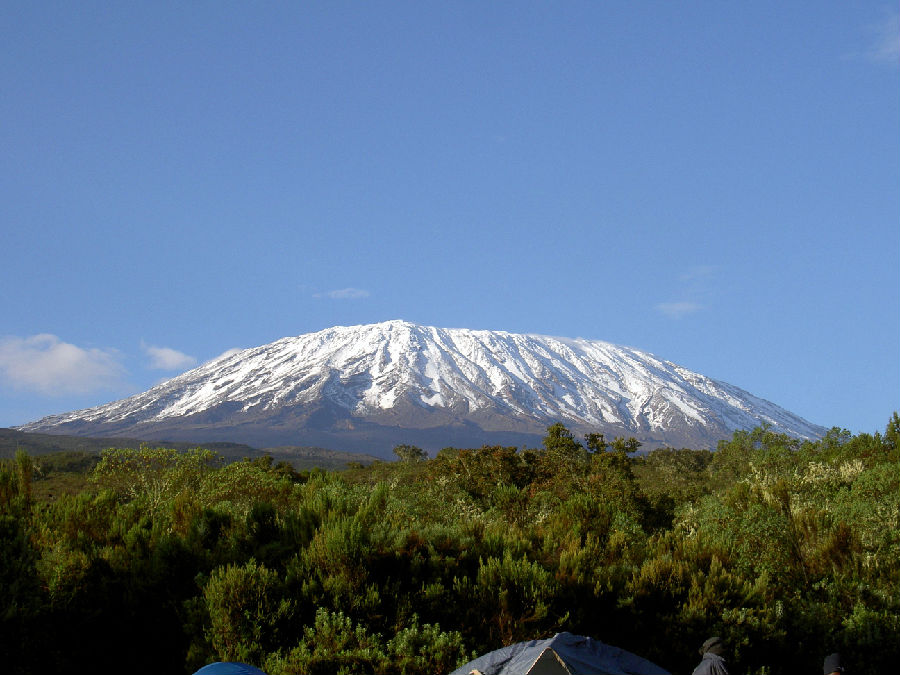It is called the Roof of Africa. Rising 19,340 feet nearly 4 miles into the sky, Mount Kilimanjaro is the highest point on the entire African continent.
Located in northeastern Tanzania in east Africa, Mount Kilimanjaro is about equal distant from Cairo to the north and Cape Town to the south, around 220 miles south of the equator. The majestic snow-capped peaks of Kilimanjaro have long captured the world's imagination. Thousands have traveled to Tanzania to climb the mountain, or to view its famous glacier-covered peak. One such visitor, the American author Earnest Hemingway, even wrote a story about it. In The Snows of Kilimanjaro, Hemingway described the mountain's ice fields as widest all over the world, great, high and unbelievably white in the sun.
As spectacular as it is to see, the ice on top of Mount Kilimanjaro serves a much more important purpose. Formed more than 11, 000 years ago, the glaciers are a vital source of drinking and farming water for those who live in the surrounding areas. But for the last century the snows have been disappearing. Kilimanjaro’s glaciers have shrunk by more than 80% since 1912. This can be seen in pictures that the NASA satellite Landsat has been taking of the mountain's ice cap for more than a decade. This is how it looked in 1993. And this is how it looked just 7 years later in 2000.
除了宏伟壮观之外,乞力马扎罗山封顶的冰雪有更为重要的意义。这些冰川形成于1.1万多年前,是附近地区居民赖以引用和耕作的源头之水。但过去一个世纪以来,这些冰川已经消失殆尽。乞力马扎罗山的冰川自1912年以来已经缩减了80%多。这一点能从过去10多年来美国宇航局卫星“地球资源卫星”拍下的许多冰冠图像中看出。这幅是1993年冰冠的样子,而这幅是2000年的样子,才过去了7年。
There are several theories as to why Mount Kilimanjaro’s snow is disappearing so quickly. For one thing, the mountain is located in a tropical region. For this reason, its glaciers are especially vulnerable to climate changes. One type of climate change is called global warming, which is causing a constant rise in the Earth’s temperature. Another possible reason that glaciers are melting is deforestation, which happens when trees are cut down in mass quantities. Trees keep the air cooler and add moisture to the atmosphere which helps create clouds and precipitation.
关于乞力马扎罗山冰川消失如此之快的原因,有几个说法。有人认为,乞力马扎罗山位于热带地区。所以,其冰川极易受到气候变化的影响。其中一种气候变化就是全球变暖,这种变化引起地球气温持续升高。另一种说法认为,乞力马扎罗山的冰川由于森林采伐,也就是大量砍伐树木。树木能让空气温度更低,并增加大气层湿度,从而有助于形成云朵并降雨。
Regardless of the causes, the snows of Kilimanjaro continue to melt. Experts predict that the mountain's glaciers could disappear completely by the year 2020. The loss of Kilimanjaro’s glaciers removes a source of water from the mountain’s surrounding area. In addition, it would probably decrease the amount of tourism and the revenue it generates to Tanzania. Finally, the disappearing snow in Africa serves as proof that the Earth, with its changing climate and warming trends, cannot always sustain its natural treasures.
不管真相是什么,乞力马扎罗山的冰川一直在融化。有专家预测,其冰川在2020年的时候会彻底消失。乞力马扎罗山的冰川一旦消失,附近地区的人就没了水源。此外,还很有可能减少游客量以及坦桑尼亚的旅游业收入。而且非洲逐渐消失的冰雪也证明:如果地球一直发生气候变化和全球变暖,那么就无法保持自然宝藏。













